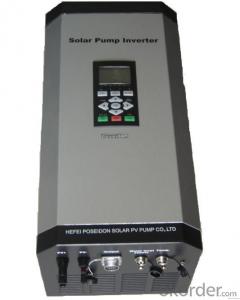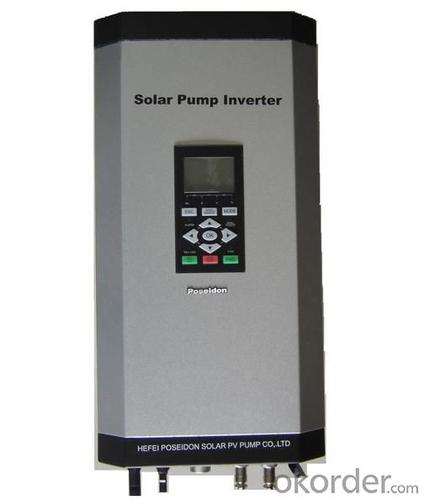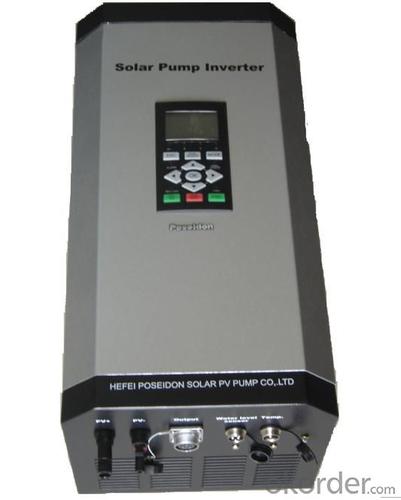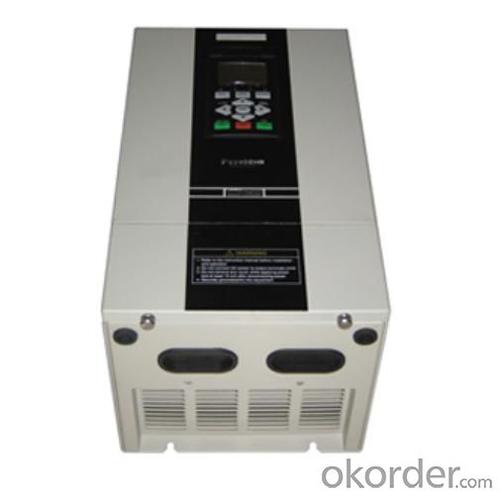Solar Pump for Home FCPM700L Inverter
- Loading Port:
- China Main Port
- Payment Terms:
- TT OR LC
- Min Order Qty:
- -
- Supply Capability:
- -
OKorder Service Pledge
Quality Product, Order Online Tracking, Timely Delivery
OKorder Financial Service
Credit Rating, Credit Services, Credit Purchasing
You Might Also Like
Solar pump inverter FCPM700L Product Description:
Solar water pumping system is constructed with solar panel array,solar pump inverter and AC water pump, DC current produced from solar panel will be delivered to solar pump inverter,and it will convert it into AC current to drive water pump,and will automatically regulate output frequency according to sun radiance intensity,maximally realize MPPT tracking function.
Features
Adopting the proposed dynamic VI maximum power point tracking (MPPT) control method, with fast response, and reliable operation, achieves efficiency of 99%.
Designed with variable frequency driver, greatly improves efficiency
Extremely high efficiency
Digital mode control, with automatic operation and manual operation mode options
Complete protection functions
Adopts intelligent IPM module, with high reliability
LCD display and operation panel, in real time presents operating data
Optional for water level measurement and control circuit
Applicable for general ACC pumps, like centrifugal pump, piston pump etc.
Independent intellectual property; Highly effective, the redundant reliability, exempts the maintenance and the long life.
The pumps are soft started, fully protected.
No batteries are used. So better Sunlight, more water.
Datasheet.
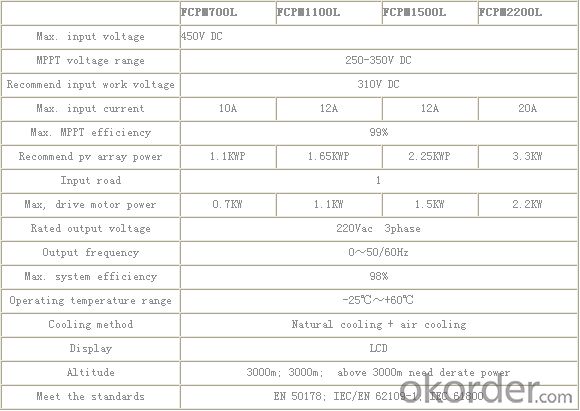
- Q: Can a solar pump be used for water supply in mining operations?
- Yes, a solar pump can be used for water supply in mining operations. Solar pumps are an efficient and sustainable option as they utilize renewable energy from the sun to power the pump. They can be used to extract water from wells, rivers, or other water sources, providing a reliable water supply for mining operations. Additionally, solar pumps are easy to install, require minimal maintenance, and can be cost-effective in the long run, making them suitable for remote mining sites.
- Q: Can a solar pump be used in areas with limited access to water storage?
- Yes, a solar pump can be used in areas with limited access to water storage. Solar pumps are designed to operate independently of a grid or electricity supply, utilizing solar energy to pump water from a source such as a well or a water body. They can be used in remote areas where access to water storage may be limited, providing a reliable and sustainable solution for water supply.
- Q: Can a solar pump be used for water supply in disaster-stricken areas?
- Yes, a solar pump can be used for water supply in disaster-stricken areas. Solar pumps are a reliable and sustainable solution for providing access to water in areas where traditional power sources may be disrupted or unavailable. These pumps are powered by solar energy and do not require fuel or electricity, making them cost-effective and environmentally friendly. In disaster-stricken areas, access to clean water is often a critical need. Solar pumps can be used to extract water from wells, boreholes, or other water sources, and to distribute it to communities for drinking, irrigation, or other purposes. They can be easily installed and operated, requiring minimal maintenance and no ongoing fuel costs. Furthermore, solar pumps can be equipped with storage systems, allowing water to be collected and stored during daylight hours for use during the night or during overcast days. This ensures a continuous and reliable water supply, even in challenging conditions. Additionally, solar pumps can be integrated with water purification systems to provide clean and safe drinking water in disaster-stricken areas where water sources may be contaminated. This combination of solar pumping and water purification can greatly improve the overall water supply situation and help prevent the spread of waterborne diseases. Overall, solar pumps offer a practical and sustainable solution for water supply in disaster-stricken areas. They provide a reliable source of water without the need for conventional power sources, making them an ideal choice for ensuring access to clean water in emergency situations.
- Q: Are solar pumps suitable for use in mining operations?
- Yes, solar pumps are suitable for use in mining operations. They provide a reliable and cost-effective solution for pumping water, slurry, or chemicals in mining sites. Solar pumps are self-contained and do not require access to electricity grids, making them ideal for remote or off-grid mining locations. Additionally, they have low maintenance requirements and can operate continuously, reducing downtime and improving overall efficiency in mining operations.
- Q: Are there any limitations on the distance water can be pumped with a solar pump?
- Yes, there are limitations on the distance water can be pumped with a solar pump. The maximum pumping distance depends on various factors such as the power of the solar pump, efficiency of the pumping mechanism, elevation changes, friction losses in the pipe, and the desired flow rate. Generally, solar pumps are most effective for shorter pumping distances, typically up to a few hundred feet. Beyond that, the pumping efficiency decreases, and additional equipment may be required to overcome the limitations.
- Q: Can solar pumps be used in both shallow and deep wells?
- Yes, solar pumps can be used in both shallow and deep wells. However, the type of solar pump required may vary depending on the water depth. Shallow well pumps are typically surface pumps, while deep well pumps are submersible. It's important to choose the appropriate solar pump based on the specific well depth to ensure optimal performance.
- Q: How does a solar pump help in reducing the risk of waterborne illnesses?
- A solar pump helps in reducing the risk of waterborne illnesses by providing a reliable and sustainable source of clean water. It eliminates the need for manual labor or reliance on unreliable electricity sources, ensuring a consistent supply of safe water for drinking, cooking, and sanitation. This reduces the dependence on contaminated water sources, which are often breeding grounds for waterborne diseases, and thus helps in preventing the spread of illnesses caused by pathogens present in unclean water.
- Q: Are there any government incentives or subsidies for using solar pumps?
- Yes, many governments around the world offer incentives and subsidies for using solar pumps. These incentives aim to promote the adoption of renewable energy sources, reduce dependence on traditional power sources, and stimulate the growth of the solar pump industry. These incentives can include tax credits, grants, subsidies for equipment installation and maintenance, and favorable financing options.
- Q: Can a solar pump be used in areas with limited access to water filtration systems?
- Yes, a solar pump can be used in areas with limited access to water filtration systems. Solar pumps are a sustainable and cost-effective solution for pumping water from various sources such as rivers, lakes, or wells. While these sources may have limited access to proper water filtration systems, the pumped water can still be treated using portable filtration methods like ceramic filters or UV sterilizers to ensure its safety and suitability for use. Thus, a solar pump can provide a reliable water supply even in areas with limited access to water filtration systems.
- Q: How much water can a solar pump supply?
- The supply of water from a solar pump is influenced by various factors. These factors include the size and capacity of the pump, the intensity of sunlight, and the efficiency of the system. In general, solar pumps can provide anywhere from a few hundred liters to several thousand liters of water per day. However, it is important to consider that this estimate can vary significantly depending on the specific circumstances and conditions at the installation site. Furthermore, the depth of the water source, the distance the water needs to be lifted, and the required pressure can also affect the pump's ability to supply water. Therefore, it is recommended to seek guidance from a professional or consult the manufacturer's specifications for a more precise estimate of the water supply capacity of a particular solar pump model.
Send your message to us
Solar Pump for Home FCPM700L Inverter
- Loading Port:
- China Main Port
- Payment Terms:
- TT OR LC
- Min Order Qty:
- -
- Supply Capability:
- -
OKorder Service Pledge
Quality Product, Order Online Tracking, Timely Delivery
OKorder Financial Service
Credit Rating, Credit Services, Credit Purchasing
Similar products
Hot products
Hot Searches
Related keywords

